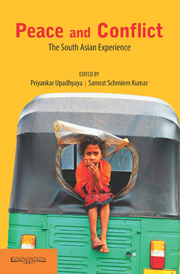Book contents
- Frontmatter
- Contents
- Foreword
- Preface
- Introduction
- 1 Conflict Resolution and Peacebuilding: Ideas, Approaches and Debates
- 2 Changing Perspectives on Peace Studies in South Asia
- 3 Peace Pedagogies in South Asia: Interreligious Understanding
- 4 Responses of Communities to Social Tension
- 5 Plurality of Peace, Non-violence and Peace Works in India
- 6 Education and Culture of Peace: Engaging with Gandhi
- 7 Structural Violence and Human Security: Gandhi's Visions
- 8 Women and the Peace Process in Nepal
- 9 Quest for Peace and Justice in Pakistan: Lawyers' Non-violent Resistance
- 10 Antinomies of Democracy and Peace in Nepal
- 11 Post-armed Conflict Trajectories in Sri Lanka
- 12 Environmental Security and Conflict in Bangladesh: Nature, Complexities and Policies
- Contributors
- Bibliography
- Index
Foreword
Published online by Cambridge University Press: 05 October 2014
- Frontmatter
- Contents
- Foreword
- Preface
- Introduction
- 1 Conflict Resolution and Peacebuilding: Ideas, Approaches and Debates
- 2 Changing Perspectives on Peace Studies in South Asia
- 3 Peace Pedagogies in South Asia: Interreligious Understanding
- 4 Responses of Communities to Social Tension
- 5 Plurality of Peace, Non-violence and Peace Works in India
- 6 Education and Culture of Peace: Engaging with Gandhi
- 7 Structural Violence and Human Security: Gandhi's Visions
- 8 Women and the Peace Process in Nepal
- 9 Quest for Peace and Justice in Pakistan: Lawyers' Non-violent Resistance
- 10 Antinomies of Democracy and Peace in Nepal
- 11 Post-armed Conflict Trajectories in Sri Lanka
- 12 Environmental Security and Conflict in Bangladesh: Nature, Complexities and Policies
- Contributors
- Bibliography
- Index
Summary
Peace, though eternally elusive, has been the focus of intense attention throughout the ages, but more so in recent times after the end of the Second World War. Unfortunately, the peace dividend that was expected did not materialize and instead we had prolonged cold war till 1945, the world has seen a large number of conflicts within and between countries, and South Asia is no exception.
India has had one conflict with China and four with Pakistan during this period, plus a disastrous intervention in Sri Lanka. The shadow of international terrorism, at one stage largely initiated in Pakistan, has assumed menacing proportions and is, in fact, threatening that country itself. The situation in Afghanistan with the imminent withdrawal of US troops is still uncertain, despite brave attempts to build a democratic system capable of withstanding the fundamentalist Taliban. Sri Lanka saw a bloody civil war resulting in huge casualties, particularly to the minority Tamil population. In Bangladesh also, there has been a great deal of tension, while in Nepal, although the ancien regime was toppled, the country is still far from emerging as a stable and viable democracy. Even tiny Maldives has had its share of internal conflict and confusion.
We thus find that South Asia is in turmoil, which makes peace and conflict resolution studies all the more relevant and significant. The present volume edited by Priyankar Upadhyaya and Samrat Schmiem Kumar brings together a dozen academic papers on this theme from a wide spectrum of scholars in India and abroad. It deals with many facets of the unrest in South Asia, and lays out alternative scenarios for a movement towards peace and conflict resolution in this region. I warmly commend the editors, and am sure this book will be of considerable value to students of peace and reconciliation studies around the world.
- Type
- Chapter
- Information
- Peace and ConflictThe South Asian Experience, pp. v - viPublisher: Foundation BooksPrint publication year: 2014



